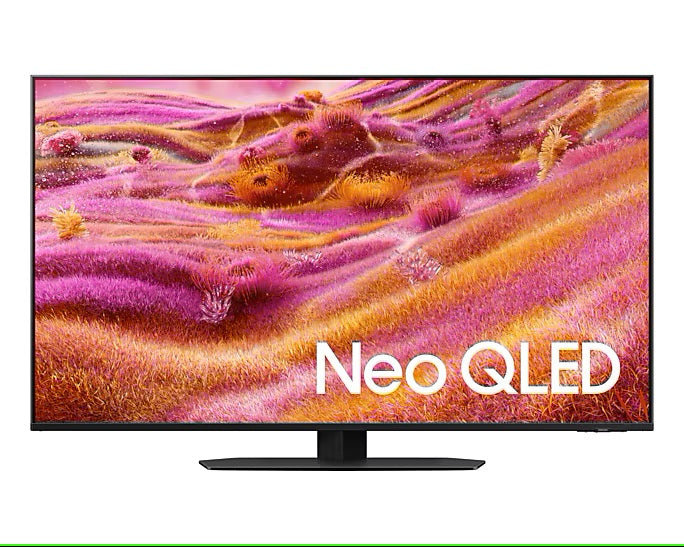
Samsung vs LG: The Battle of OLED and QLED Continues (2025 Edition)
Share
When it comes to premium TVs, Samsung and LG have been at the top of the game for years — but they’ve taken very different paths. LG has long championed OLED technology, while Samsung countered with QLED and more recently, their own take on OLED: QD-OLED.
In 2025, the competition between these two Korean tech giants has intensified with new flagship models, cutting-edge innovations, and smarter platforms. If you’re looking for a new high-end TV this year, this showdown is one you can’t ignore.
Display Technology: OLED vs QLED vs QD-OLED
LG’s OLED Evo Panels (2025)
LG's OLED G4 and C4 models use its new OLED Evo technology with improved brightness and image processing. OLED is known for perfect blacks, infinite contrast, and ultra-slim designs. LG’s Alpha 11 processor boosts AI-driven image clarity and brightness uniformity across the screen.
Samsung’s Neo QLED and QD-OLED (2025)
Samsung continues to evolve both Neo QLED (Mini-LED backlit) and QD-OLED. The flagship S95D QD-OLED blends the deep blacks of OLED with the color volume and brightness of QLED, using quantum dots. Their QN95D Neo QLED is great for bright rooms, offering precise local dimming and high peak brightness.
✅ Winner (Contrast and Blacks): LG OLED
✅ Winner (Brightness and Vibrancy): Samsung QD-OLED / Neo QLED
Picture Quality and Processing
LG (Alpha 11 Processor):
New for 2025, LG’s Alpha 11 chip offers enhanced AI Picture Pro technology. It intelligently analyzes scenes for depth and clarity, and adapts color tone mapping in real-time.
Samsung (Neural Quantum Processor 4.0):
Samsung's chip is no slouch either — it enhances HDR tone mapping, improves AI upscaling, and includes real-time gaming optimization with HDR remastering.
✅ Winner (Natural Colors & Cinema): LG
✅ Winner (HDR Impact & Sharpness): Samsung
Smart Platforms: webOS vs Tizen
LG webOS 24:
LG’s latest webOS is more customizable, with user profiles, curated recommendations, and smart home controls via ThinQ AI.
Samsung Tizen (2025):
Samsung's Tizen platform integrates with SmartThings and Samsung’s Gaming Hub. It supports cloud gaming, voice assistants, and a wide app library.
✅ Winner (Customization): LG
✅ Winner (Gaming/Smart Home): Samsung
Gaming Performance
Both LG and Samsung are excellent choices for gamers, offering:
4K @ 120Hz (HDMI 2.1)
VRR (Variable Refresh Rate)
ALLM (Auto Low Latency Mode)
Game Optimizer Dashboards
Notable Models:
LG G4/C4: Game Optimizer with customizable settings
Samsung S95D/QN95D: Samsung Gaming Hub, supports cloud services like Xbox Game Pass
✅ Winner: Tie — both are outstanding for next-gen gaming
Design and Build Quality
LG G4: Ultra-thin, flush-to-wall “Gallery Design”
Samsung S95D: Ultra-slim with a new glare-free finish and One Connect box
✅ Winner (Mounting Elegance): LG
✅ Winner (Clutter-Free Setup): Samsung
Price and Value in 2025
LG OLEDs tend to be a bit more expensive, especially at larger sizes.
Samsung Neo QLEDs often offer brighter screens for the price.
Samsung’s QD-OLED models are slightly more affordable this year compared to LG’s G-series OLEDs.
✅ Winner (Value for Bright Rooms): Samsung
✅ Winner (Value for Dark Rooms & Home Theaters): LG
Final Verdict: Which One Should You Buy in 2025?
Choose LG if you prioritize true black levels, cinema-grade visuals, and a cleaner wall-mounted look.
Choose Samsung if you want a brighter TV, better performance in well-lit rooms, and a more integrated gaming/smart home experience.
Both brands are neck-and-neck, but the choice really comes down to your environment and your preferences.
